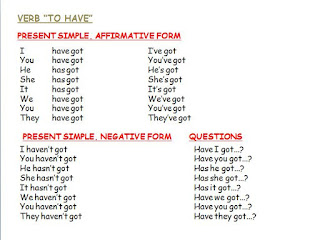domingo, 20 de noviembre de 2016
domingo, 6 de noviembre de 2016
DAILY ROUTINES
Here you have a great selection of exercises about daily routines.
A memory game.
Another memory game.
A memory game.
Another memory game.
domingo, 16 de octubre de 2016
FAMILY RELATIONS AND NAMES
Family names translated into Spanish.
Are you sure you know all the family names? uh, uh, let's check it! Click here.
Are you sure you know all the family names? uh, uh, let's check it! Click here.
Click here if you want to learn more vocabulary about family.
EXPRESSING POSSESSION
VERB HAVE GOT
Basic exercise.
To listen and practise pronunciation, click here.
Exercise 2.
Exercise 3.
Exercise 4. Practise with a video. You have also got some online exercises.
And many more exercises. Click here.
POSSESSIVE ADJECTIVES
To listen and practise pronunciation, click here.
Exercise 2.
Exercise 3.
Exercise 4. Practise with a video. You have also got some online exercises.
And many more exercises. Click here.
POSSESSIVE ADJECTIVES
Here you can listen to the possessive adjectives.
And many more exercises to practise.
lunes, 10 de octubre de 2016
miércoles, 5 de octubre de 2016
THIS, THAT, THESE AND THOSE
Los demostrativos en inglés (demonstrative) se usan para indicar la distancia relativa entre dos ó más personas u objetos.
Los demostrativos
señalan si el sustantivo del que se habla es singular o plural y a qué
distancia se encuentran de los interlocutores, cerca o lejos.
Los demostrativos pueden funcionar como pronombres o como adjetivos si van delante de un sustantivo. En inglés son:
(Puedes entrar en forvo o en wordreference y escuchar cómo se pronuncian)
This - Esta, esto, este
That - Esa , eso, ese
These - Estas, estos
Those - Esas, esos, aquellas, aquellos
PRACTISE:
Matching exercise.
Exercise1. (Con audio)
Exercise 2.
Exercise 3.
Exercise4.
Exercise 5.
Exercise 6.
Many more exercises.
domingo, 2 de octubre de 2016
COUNTRIES AND NATIONALITIES
Exercise 1: give the nationality for each country.
Exercise 2: choose the correct natonality.
Exercise 3:give the nationality for each country.
Exercise 4: complete the sentences with the nationalities
Exercise 5:give the nationality for each country.
History of the Unión Jack.
Learn about the European Union.
Exercise 1: give the nationality for each country.
Exercise 2: choose the correct natonality.
Exercise 3:give the nationality for each country.
Exercise 4: complete the sentences with the nationalities
Exercise 5:give the nationality for each country.
History of the Unión Jack.
Learn about the European Union.
martes, 27 de septiembre de 2016
VERB TO BE
VERB TO BE
Click here to LISTEN to the forms of verb be.
Here you have some interactive exercises to practise verb BE.
Exercise 1.
Execise 2.
Exercise 3.
Exercise 4.
And here you have a lot of more exercise to pracrise.
| FORMA AFIRMATIVA | FORMA NEGATIVA | FORMA INTERROGATIVA |
| I am (I'm) | I am not (I'm not) | am I? |
| soy, estoy | no soy, no estoy | ¿soy yo?, ¿estoy yo? |
| you are (you're) | you are not (you're not) | are you? |
| eres, estás | no eres, no estás | ¿eres tú?, ¿estás tú? |
| he is (he's) | he is not (he's not) | is he? |
| él es, está | él no es, no está | ¿es él?, ¿está él? |
| we are (we're) | we are not (we're not) | are we? |
| somos, estamos | no somos, no estamos | ¿somos?, ¿estamos? |
| you are (you're) | you are not (you're not) | are you? |
| sois, estáis | no sois, no estáis | ¿sois?, ¿estáis? |
| they are (they're) | they are not (they're not) | are they? |
| ellos son, están | ellos no son, no están | ¿son, están ellos? |
Here you have some interactive exercises to practise verb BE.
Exercise 1.
Execise 2.
Exercise 3.
Exercise 4.
And here you have a lot of more exercise to pracrise.
domingo, 25 de septiembre de 2016
GREETINGS
HEY, WHAT'S UP?
Here you have some useful expressions to greet people
Watch this video.
Another video.
Here you have some useful expressions to greet people
Watch this video.
Another video.
miércoles, 21 de septiembre de 2016
martes, 20 de septiembre de 2016
NUMBERS
Here you have the pronunciation of ordinal numbers.
Here you have the pronunciation of cardinal numbers.
Do you dare with big numbers? Four, five, six and more figures? Click here.
Listening practice.
Here you have the pronunciation of ordinal numbers.
Here you have the pronunciation of cardinal numbers.
Do you dare with big numbers? Four, five, six and more figures? Click here.
Listening practice.
SAY THE DATE
DAYS AND MONTHS: SAYING THE DATE
To say the date is easier today. Click here and review days, months and ordinal numbers.
To say the date is easier today. Click here and review days, months and ordinal numbers.
MY SCHOOL THINGS
 |
| SCHOOL THINGS |
Listen, repeat and memorize school objects.
Wanna play and check your knowledge?. Click here.
More games? Click here.
Suscribirse a:
Entradas (Atom)










